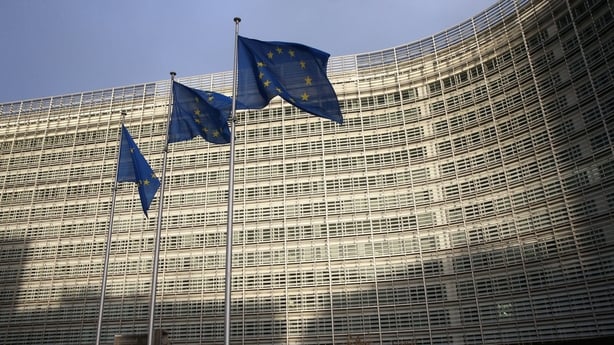The European Union has given the green light to its post-Brexit trade deal with the UK, clearing the way for it to come into effect in the New Year.
The British parliament will have to ratify the deal later this week, but Brussels will apply it provisionally, cushioning the economic shock of the divorce.
Customs and regulatory controls on cross-Channel commerce will still come into effect on 1 January after Britain leaves the EU single market.
But there will be no immediate return to a regime of tariffs and quotas that could have disrupted trade after Britain's decision to quit the club.
Sebastian Fischer, spokesman for the German presidency of the EU, said: "EU Ambassadors have unanimously approved the provisional application of the EU-UK Trade and Cooperation Agreement."
Under EU procedure, the decision by ambassadors from the 27 member states to endorse the plan will take effect at 2pm Irish time tomorrow.
But there is no expectation that any EU members will now slow the adoption of the trade deal, the fruit of a tortuous 10-month negotiation.
We need your consent to load this rte-player contentWe use rte-player to manage extra content that can set cookies on your device and collect data about your activity. Please review their details and accept them to load the content.Manage Preferences
Here in Ireland, the Government has signed off on the post-Brexit trade deal following a specially convened Cabinet meeting this afternoon. Ministers also agreed a €100m scheme to support the agri-food industry.
Meanwhile, European Council President Charles Michel and British Prime Minister Boris Johnson spoke by phone today.
Both leaders agreed to intensify the future cooperation between the UK and the EU in the fight against climate change.
They also agreed to intensify work on the global response to pandemics. The idea of a possible treaty on pandemics, which could help to strengthen global preparedness and response, was discussed.
Mr Michel and Mr Johnson welcomed the "fair and balanced agreement" reached on the future relationship between the UK and the EU.
‼️Green light for #BrexitDeal: EU Ambassadors have unanimously approved the provisional application of the EU-UK Trade and Cooperation Agreement as of January 1, 2021.
— Sebastian Fischer (@SFischer_EU) December 28, 2020
👉 Next step: Final adoption by use of written procedure. Deadline: Tomorrow, 15.00 hours. #TCA #COREPER 🇪🇺🇬🇧 pic.twitter.com/k76Iei9xm0
France said it supports the draft post-Brexit agreement and will be very vigilant from day one of good implementation of the deal.
Germany holds the rotating EU presidency and Chancellor Angela Merkel's spokesperson Ulrike Demmer said the coalition government has no objection to the text.
"Germany can accept the negotiated accord," she said.
The European Parliament will want to study the deal even after its provisional application and was expected to convene a session in the first half of next year to ratify it.
But today, MEPs were discussing the possibility of pushing that date back further to give themselves more time to study the text and to watch how relations develop.
The member states' provisional approval will last until the end of February, but EU parliamentary leaders asked today for a few more weeks to arrange a vote in March or April.
But if Britain refuses this delay, they have agreed to hold a special plenary session on or around 23 February.
Brussels' chief negotiator Michel Barnier met European Parliament president David Sassoli and the MEPs coordinating EU-UK ties today.
He described the exchanges as "fruitful" and thanked the MEPs "for their trust and support throughout this extraordinary negotiation."

British parliamentarians are to meet on Wednesday to debate the accord.
Although the 2016 Brexit referendum that set the divorce in motion proved to be extremely divisive, the vote is expected to go smoothly.
The MPs have not had long to study the 1,200-page text, but British Prime Minister Boris Johnson has a comfortable majority of Conservative MPs in the Commons and has hailed the accord as a victory.
The minority Scottish National Party will oppose the deal - as it opposed Brexit - but the main Labour opposition will back it to avoid further disruption.
Meanwhile the Northern Ireland Assembly is set to be recalled to discuss the Brexit trade deal.
The agreement offers the British duty-free and quota-free access to its market of 450 million consumers, and gives European fishermen access to UK waters for at least another five-and-a-half years.
In Holyhead, traffic easing measures are to be introduced today with fears of queues and traffic backlogs amid new customs regulations from New Year's Day.
The Welsh port is the second largest "roll-on roll-off" port after Dover, and carries 1,200 lorries and trailers a day across the Irish Sea.

